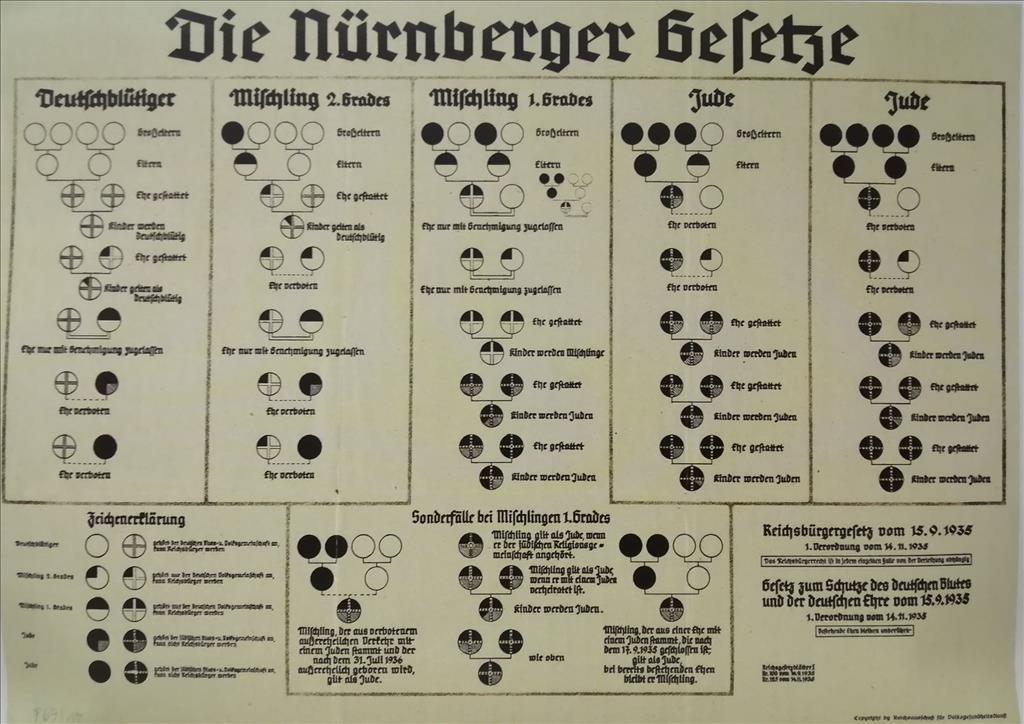Nuremberg laws

The coming to power of Adolf Hitler in 1933, the abolition of the Reichstag and the acquisition of absolute power, as well as the self-appointment as the Führer (absolute leader) created conditions for realization of anti-Semitic Nazi ideology through formal legal adoption of legislation. Thus, on 15 September 1935 an extraordinary meeting of the Nazi Party was held in Nuremberg at which anti-Semitic and racist laws were enacted, altogether conceived in two laws. One of these was the Law on Citizenship and the other one was the Law on Protection of the German Race and Honor.
The first law stipulated that a German citizen could only be a German of pure Aryan descent, while the rest would be only "subjects" or people classified as state subjects without the right to citizenship. The second law forbade mixed marriages between Germans and Jews, the existing marriages were annulled, extramarital partnerships between Jews and Germans were banned and the law included a series of civil and human rights restrictions on Jews. In addition to these norms, an additional decree was adopted in November which precisely explained and defined who is a Jew. The definition of "Jew" does not define one as such solely on the basis of their religious beliefs, but as anyone who had three or four ancestors (grandparents) who were of Jewish descent, regardless whether they individually identified themselves as Jews or were members of the Jewish religious community. Many Germans who had not practiced Judaism for years or were never part of that same religious community became victims of Nazi terror. This also included Germans whose ancestors converted from Judaism to Christianity.
This law stipulated that spouses were also required to submit documents obtained from the public health institution, before getting married, that they are healthy to marry. These certificates restricted the marriage of those people who had "hereditary diseases", infectious diseases or those who violated the marriage provisions of the Nuremberg laws. This law also expanded the list and, in addition to the Jews, Roma and black people were also added to the list of those who are marginalized. These additional provisions defined these categories of citizens as enemies of the state.
The adoption of the Nuremberg laws had a significant social and economic impact on the Jewish community in Germany. Mass persecutions followed, as well as trials for violating the laws in terms of marital laws, and after serving prison sentences the people were sent to concentration camps. This also contributed to segmentation in the German society – the non-Jews ceased to maintain contact with Jews, a boycott of Jewish businesses started and as a result of that a significant portion of Jewish businesses went bankrupt or were closed due to reduced number of customer.
The Nuremberg laws, as well as the previously adopted regulations forbade Jews from working in the state administration, including in other professions such as education and health. Their social participation was limited and they were prevented from being active in any way in the society.
The implementation of the Nuremberg laws was relaxed during the 1936 Olympic Games in Berlin in order not to draw the attention of the world to the situation in the German society. After the Olympics, Nazi persecution of Jews intensified. In 1937 and 1938, the government amended the law to require Jews to register their property, which meant that German Jewish workers and owners were fired, and ownership of Jewish businesses was transferred to non-Jewish Germans who bought them at very favorable prices set by the Nazis. The Jewish physicians were forbidden to treat non-Jewish patients while Jewish lawyers were strictly forbidden to practice law.
The Nuremberg legislation provided for Jews to carry identification documents marked with a red letter "J" by government officials, indicating that the person belonged to the Jewish community, and for those with atypical Jewish names, the addition of "Jewish" middle name was mandatory –"Israel" for men and "Sarah" for women. With this type of identification documents, the police could more easily identify the Jews.
Share: << Back
Any help from you is more than welcome.
Donate to continue with the successful work and education




